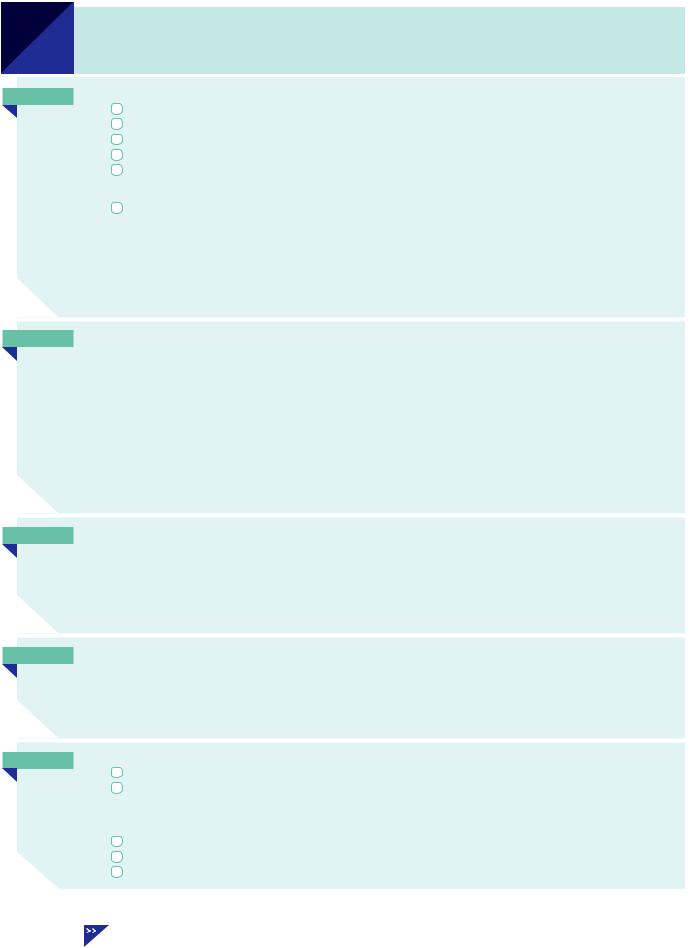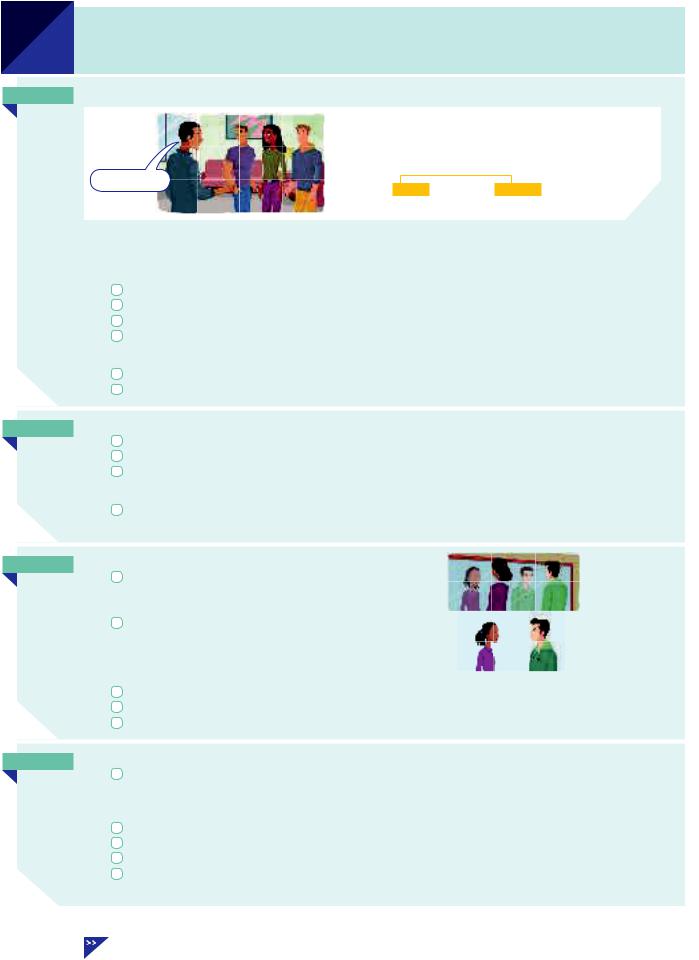
- •Contents
- •Thanks
- •To the student
- •To the teacher
- •3 Present continuous and present simple 1 (I am doing and I do)
- •10 Present perfect continuous and simple (I have been doing and I have done)
- •11 how long have you (been) … ?
- •12 for and since when … ? and how long … ?
- •13 Present perfect and past 1 (I have done and I did)
- •14 Present perfect and past 2 (I have done and I did)
- •15 Past perfect (I had done)
- •16 Past perfect continuous (I had been doing)
- •17 have and have got
- •18 used to (do)
- •19 Present tenses (I am doing / I do) for the future
- •20 I’m going to (do)
- •21 will and shall 1
- •22 will and shall 2
- •23 I will and I’m going to
- •24 will be doing and will have done
- •26 can, could and (be) able to
- •27 could (do) and could have (done)
- •28 must and can’t
- •29 may and might 1
- •30 may and might 2
- •31 have to and must
- •32 must mustn’t needn’t
- •33 should 1
- •34 should 2
- •35 I’d better … it’s time …
- •36 would
- •39 if I knew … I wish I knew …
- •40 if I had known … I wish I had known …
- •41 wish
- •42 Passive 1 (is done / was done)
- •43 Passive 2 (be done / been done / being done)
- •44 Passive 3
- •45 it is said that … he is said to … he is supposed to …
- •46 have something done
- •47 Reported speech 1 (he said that …)
- •48 Reported speech 2
- •49 Questions 1
- •52 Question tags (do you? isn’t it? etc.)
- •53 Verb + -ing (enjoy doing / stop doing etc.)
- •54 Verb + to … (decide to … / forget to … etc.)
- •55 Verb (+ object) + to … (I want you to …)
- •56 Verb + -ing or to … 1 (remember, regret etc.)
- •57 Verb + -ing or to … 2 (try, need, help)
- •58 Verb + -ing or to … 3 (like / would like etc.)
- •59 prefer and would rather
- •60 Preposition (in/for/about etc.) + -ing
- •61 be/get used to … (I’m used to …)
- •63 there’s no point in -ing, it’s worth -ing etc.
- •64 to … , for … and so that …
- •65 Adjective + to …
- •66 to … (afraid to do) and preposition + -ing (afraid of -ing)
- •67 see somebody do and see somebody doing
- •68 -ing clauses (He hurt his knee playing football.)
- •69 Countable and uncountable 1
- •70 Countable and uncountable 2
- •71 Countable nouns with a/an and some
- •74 the 2 (school / the school etc.)
- •75 the 3 (children / the children)
- •77 Names with and without the 1
- •78 Names with and without the 2
- •79 Singular and plural
- •80 Noun + noun (a bus driver / a headache)
- •81 -’s (your sister’s name) and of … (the name of the book)
- •82 myself/yourself/themselves etc.
- •83 a friend of mine my own house on my own / by myself
- •84 there … and it …
- •85 some and any
- •87 much, many, little, few, a lot, plenty
- •90 all every whole
- •91 each and every
- •92 Relative clauses 1: clauses with who/that/which
- •94 Relative clauses 3: whose/whom/where
- •95 Relative clauses 4: extra information clauses (1)
- •96 Relative clauses 5: extra information clauses (2)
- •97 -ing and -ed clauses (the woman talking to Tom, the boy injured in the accident)
- •98 Adjectives ending in -ing and -ed (boring/bored etc.)
- •99 Adjectives: a nice new house, you look tired
- •100 Adjectives and adverbs 1 (quick/quickly)
- •102 so and such
- •104 quite, pretty, rather and fairly
- •105 Comparative 1 (cheaper, more expensive etc.)
- •106 Comparative 2 (much better / any better etc.)
- •107 Comparative 3 (as … as / than)
- •108 Superlative (the longest / the most enjoyable etc.)
- •109 Word order 1: verb + object; place and time
- •110 Word order 2: adverbs with the verb
- •111 still any more yet already
- •112 even
- •114 in case
- •116 as (as I walked … / as I was … etc.)
- •117 like and as
- •119 during for while
- •121 at/on/in (time)
- •122 on time and in time at the end and in the end
- •123 in/at/on (position) 1
- •124 in/at/on (position) 2
- •125 in/at/on (position) 3
- •126 to, at, in and into
- •127 in/on/at (other uses)
- •129 Noun + preposition (reason for, cause of etc.)
- •130 Adjective + preposition 1
- •131 Adjective + preposition 2
- •132 Verb + preposition 1 to and at
- •134 Verb + preposition 3 about and of
- •135 Verb + preposition 4 of/for/from/on
- •136 Verb + preposition 5 in/into/with/to/on
- •137 Phrasal verbs 1 Introduction
- •138 Phrasal verbs 2 in/out
- •139 Phrasal verbs 3 out
- •142 Phrasal verbs 6 up/down
- •143 Phrasal verbs 7 up (1)
- •144 Phrasal verbs 8 up (2)
- •145 Phrasal verbs 9 away/back
- •Additional exercises
- •Study guide
- •Key to Exercises
- •Key to Additional exercises (see page 302)
- •Key to Study guide
- •Index

Unit
81
A
-’s (your sister’s name) and of … (the name of the book)
We use -’s (apostrophe + s) mostly for people or animals:
Tom’s computer isn’t working. (not the computer of Tom)
How old are Chris’s children? (not the children of Chris)
What’s (= What is) your sister’s name?
What’s Tom’s sister’s name?
Be careful. Don’t step on the cat’s tail.
You can use -’s without a noun ater it:
This isn’t my book. It’s my sister’s. (= my sister’s book)
We do not use -’s ater a long group of words. So we say: my friend’s mother
but the mother of the man we met yesterday (not the man we met yesterday’s mother)
Note that we say a woman’s hat (= a hat for a woman), a boy’s name (= a name for a boy), a bird’s egg (= an egg laid by a bird) etc.
BWith a singular noun we use -’s:
my sister’s room (= her room – one sister)
Mr Carter’s house (= his house)
With a plural noun (sisters, friends etc.) we put an apostrophe (’) ater s: my sisters’ room (= their room – two or more sisters)
the Carters’ house (= their house – Mr and Mrs Carter)
If a plural noun does not end in -s (for example men/women/children/people) we use -’s:
the men’s changing room |
a children’s book (= a book for children) |
You can use -’s ater more than one noun: |
|
Jack and Karen’s children |
Mr and Mrs Carter’s house |
CFor things, ideas etc., we normally use of:
the temperature of the water (not the water’s temperature) the name of the book the owner of the restaurant
We say the beginning/end/middle of … / the top/bottom of … / the front/back/side of … : the beginning of the month (not the month’s beginning)
the top of the hill the back of the car
DYou can usually use -’s or of … for an organisation (= a group of people). So you can say:
the government’s decision |
or |
the decision of the government |
||
the company’s success |
or |
the success of the company |
||
We also use -’s for places. So you can say: |
|
|||
the city’s streets |
the world’s population |
Italy’s prime minister |
||
EWe use -’s with time words (yesterday / next week etc.):
Do you still have yesterday’s newspaper?
Next week’s meeting has been cancelled.
In the same way, you can say today’s / tomorrow’s / this evening’s / Monday’s etc.
We also use -’s (or -s’ with plural words) with periods of time:
I’ve got a week’s holiday starting on Monday.
Julia has got three weeks’ holiday.
I live near the station – it’s only ten minutes’ walk.
|
Noun + noun (a bus driver) Unit 80 a three-hour journey, a ten-pound note Unit 80E |
162 |
-’s (= is or has) in short forms Appendix 5.2 |

Exercises |
Unit |
81 |
|
|
|
81.1In some of these sentences, it is more natural to use -’s or -’. Change the underlined parts where necessary.
1 Who is the owner of this restaurant?
2 How old are the children of Chris?
3 Is this the umbrella of your friend?
4 Write your name at the top of the page. 5 I’ve never met the daughter of James. 6 How old is the son of Helen and Andy?
7 We don’t know the cause of the problem. 8 I don’t know the words of this song.
9 The friends of your children are here.
10What is the cost of a new washing machine?
11The garden of our neighbours is very small.
12The hair of David is very long.
13I work on the ground floor of the building.
14I couldn’t go to the party of my best friend.
15George is the brother of somebody I knew at college.
16Have you seen the car of the parents of Ben?
17What is the meaning of this expression?
18Do you agree with the policy of the government?
OK
Chris’s children
81.2 |
Which is right? |
|
|
1 |
Don’t step on the cat’s |
tail. (cat / cat’s / cats’) |
|
2 |
It’s my |
birthday tomorrow. (father / father’s / fathers’) |
|
3 |
Those |
look nice. Shall we buy some? (apples / apple’s / apples’) |
|
4 |
clothes are expensive. (Children / Children’s / Childrens’) |
||
5 |
Zurich is |
largest city. (Switzerland / Switzerland’s / Switzerlands’) |
|
6 |
Your |
parents are your grandparents. (parents / parent’s / parents’) |
|
7 |
I took a lot of |
when I was on holiday. (photos / photo’s / photos’) |
|
8 |
This isn’t my coat. It’s |
. (someone else / someone else’s / someone elses’) |
|
9 |
Have you read any of |
poems? (Shakespeare / Shakespeare’s / Shakespeares’) |
|
81.3 Read each sentence and write a new sentence beginning with the underlined words.
1 The meeting tomorrow has been cancelled.
Tomorrow’s meeting has been cancelled.
2The storm last week caused a lot of damage. Last
3The only cinema in the town has closed down. The
4 The weather in Britain is very changeable.
5 Tourism is the main industry in the region.
81.4Use the information given to complete the sentences.
1 If I leave my house at 9 o’clock and drive to the airport, I arrive at about 11.
|
So it’s about two hours’ drive |
from my house to the airport. (drive) |
2 |
If I leave my house at 8.40 and walk to the centre, I get there at 9 o’clock. |
|
|
So it’s |
from my house to the centre. (walk) |
3 |
I’m going on holiday on the 12th. I have to be back at work on the 26th. |
|
|
So I’ve got |
. (holiday) |
4 |
I went to sleep at 3 o’clock this morning and woke up an hour later. Ater that I couldn’t sleep. |
|
|
So last night I only had |
. (sleep) |
163

Unit
82 myself/yourself/themselves etc.
AStudy this example:
Steve introduced himself to the other guests.
We use myself/yourself/himself etc. (reflexive pronouns) when the subject and object are the same:
Hi, I’m Steve.
Steve introduced himself
|
|
subject |
object |
The reflexive pronouns are: |
|
|
|
singular (-self) |
myself |
yourself (one person) |
himself/herself/itself |
plural (-selves) |
ourselves |
yourselves (more than one) |
themselves |
I don’t want you to pay for me. I’ll pay for myself. (not I’ll pay for me)
Amy had a great holiday. She really enjoyed herself.
Do you talk to yourself sometimes? (said to one person)
If you want more to eat, help yourselves. (said to more than one person)
Compare:
Lisa introduced me to the other guests.
I introduced myself to the other guests.
BWe do not use myself etc. ater feel/relax/concentrate/meet:
I feel nervous. I can’t relax.
You need to concentrate. (not concentrate yourself)
What time shall we meet tomorrow?
Normally we do not use myself etc. ater wash/shave/dress:
He got up, washed, shaved and dressed. (not washed himself etc.)
You can also say get dressed (He got dressed).
CCompare -selves and each other:
Kate and Joe stood in front of the mirror and looked at themselves.
(= Kate and Joe together looked at Kate and Joe)
Kate looked at Joe, and Joe looked at Kate. They looked at each other.
You can use one another instead of each other:
How long have you and Ben known each other? or … known one another?
Sue and Alice don’t like each other. |
or … don’t like one another. |
Do they live near each other? or |
… near one another? |
themselves
each other
DWe also use myself/yourself etc. in another way. For example:
‘Who repaired your bike?’ ‘I repaired it myself.’
I repaired it myself = I repaired it, not another person. Here, myself is used to emphasise ‘I’ (= it makes it stronger). Some more examples:
I’m not going to do your work for you. You can do it yourself. (= you, not me)
Let’s paint the house ourselves. It will be much cheaper.
The film itself wasn’t very good, but I loved the music.
I don’t think Lisa will get the job she applied for. Lisa doesn’t think so herself. or Lisa herself doesn’t think so.
164 |
get dressed / get married etc. Unit 44D by myself / by yourself etc. Unit 83D |

Exercises |
Unit |
82 |
|
|
|
82.1 Complete the sentences using myself/yourself etc. + these verbs (in the correct form):
|
blame |
burn |
enjoy |
express |
hurt |
introduce |
put |
1 |
Steve |
introduced himself |
to the other guests at the party. |
|
|||
2 |
Ben fell down some steps, but fortunately he didn’t |
|
. |
||||
3 |
It isn’t Sue’s fault. She really shouldn’t |
|
|
. |
|||
4 |
Please try and understand how I feel. You have to |
|
in my position. |
||||
5 |
The children had a great time at the beach. They really |
|
. |
||||
6 |
Be careful! That pan is hot. Don’t |
|
|
. |
|||
7 |
Sometimes I can’t say exactly what I mean. I wish I could |
better. |
|||||
82.2 Put in myself/yourself/ourselves etc. or me/you/us etc.
1 |
Amy had a great holiday. She enjoyed herself . |
|
2 |
It’s not my fault. You can’t blame |
. |
3 |
What I did was really bad. I’m ashamed of |
. |
4 |
We have a problem. I hope you can help |
. |
5 |
‘Can I take another biscuit?’ ‘Of course. Help |
!’ |
6 |
I want you to meet Sarah. I’ll introduce |
to her. |
7 |
Don’t worry about us. We can take care of |
. |
8 |
Don’t worry about the children. I’ll take care of |
. |
9 |
I gave them a key to our house so that they could let |
in. |
82.3 Complete these sentences. Use myself/yourself etc. where necessary. Choose from:
|
concentrate |
defend |
dry |
enjoy |
feel |
1 |
Neil grew a beard because he was fed up with |
shaving |
|||
2 |
Amy had a great holiday. She enjoyed herself . |
||||
3 |
I wasn’t very well yesterday, but I |
|
|
||
4 |
I climbed out of the swimming pool and |
|
|||
5 |
I tried to study, but I couldn’t |
|
|
|
|
6 |
If somebody attacks you, you have the right to |
|
|||
7 |
I’m going out with Chris this evening. We’re |
|
|||
8 |
You’re always rushing. Why don’t you sit down and |
||||
meet relax shave
.
much better today. with a towel.
.
.
at 7.30.
?
82.4 Complete the sentences with ourselves/themselves or each other.
1 |
How long have you and Ben known |
each other ? |
|
|
2 |
If people work too hard, they can make |
ill. |
|
|
3 |
I need you and you need me. We need |
. |
|
|
4 |
In Britain friends oten give |
presents at Christmas. |
|
|
5 |
Some people are selfish. They only think of |
. |
|
|
6 |
Tracy and I don’t see |
very oten these days. |
|
|
7 |
We couldn’t get back into the house. We had locked |
|
out. |
|
8 |
They’ve had an argument. Now they’re not speaking to |
|
. |
|
9 |
We’d never met before, so we introduced |
to |
. |
|
82.5 Complete the sentences using myself/yourself etc. Use the verb in brackets.
1 |
‘Who repaired the bike for you?’ |
‘Nobody. I repaired it myself |
.’ (repair) |
2 |
I didn’t buy this cake from a shop. I |
. (make) |
|
3 |
‘Who told you Laura was going away?’ ‘Laura |
.’ (tell) |
|
4 |
I don’t know what they’re going to do. I don’t think they |
. (know) |
|
5 |
‘Who cuts Paul’s hair for him?’ |
‘Nobody. He |
.’ (cut) |
6 |
‘Can you phone Sam for me?’ |
‘Why can’t you |
?’ (do) |
Additional exercise 30 (page 320) |
165 |
